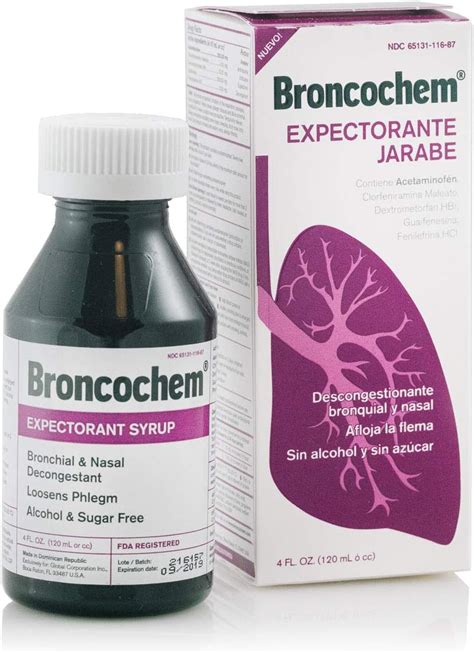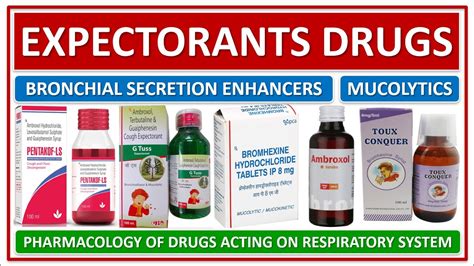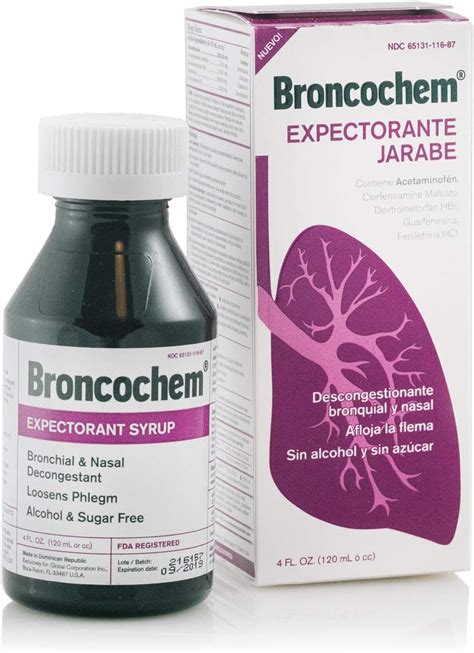Intro
Discover what an expectorant is, its benefits, and how it thins mucus, relieving coughs and congestion with bronchodilators and mucolytics for respiratory relief.
Expectorants are a type of medication that helps loosen and clear mucus from the lungs, making it easier to cough up. They are commonly used to relieve symptoms of respiratory conditions such as bronchitis, asthma, and chronic obstructive pulmonary disease (COPD). Expectorants work by increasing the amount of water in the mucus, making it thinner and more easily coughed up. This can help reduce congestion, coughing, and wheezing, making it easier to breathe.
The use of expectorants dates back to ancient times, with various herbal remedies and natural substances being used to help relieve respiratory symptoms. Today, there are several over-the-counter (OTC) and prescription expectorants available, including guaifenesin, which is one of the most commonly used expectorants. Expectorants can be taken orally, usually in the form of a syrup or tablet, and are often combined with other medications such as cough suppressants and decongestants.
In addition to their use in relieving respiratory symptoms, expectorants have also been shown to have anti-inflammatory properties, which can help reduce inflammation in the lungs and airways. This can be particularly beneficial for people with chronic respiratory conditions, as it can help reduce the frequency and severity of symptoms. Overall, expectorants are an important medication for relieving respiratory symptoms and improving lung health.
How Expectorants Work

There are several different types of expectorants, including guaifenesin, which is one of the most commonly used expectorants. Guaifenesin works by increasing the amount of water in the mucus, making it thinner and more easily coughed up. It is often combined with other medications such as cough suppressants and decongestants to provide relief from a range of respiratory symptoms.
Types of Expectorants
There are several different types of expectorants, including: * Guaifenesin: This is one of the most commonly used expectorants and works by increasing the amount of water in the mucus, making it thinner and more easily coughed up. * Acetylcysteine: This expectorant works by breaking down mucus, making it easier to expel from the lungs. * Bromhexine: This expectorant works by increasing the production of surfactant, a substance that helps reduce the surface tension of mucus, making it easier to expel from the lungs. * Ambroxol: This expectorant works by increasing the production of surfactant and reducing the viscosity of mucus, making it less sticky and easier to cough up.Benefits of Expectorants

Expectorants are generally safe and well-tolerated, but they can cause some side effects, such as nausea, vomiting, and diarrhea. They can also interact with other medications, such as blood thinners and diabetes medications, so it is essential to talk to a doctor before taking an expectorant.
Side Effects of Expectorants
Expectorants can cause some side effects, including: * Nausea and vomiting * Diarrhea * Abdominal pain * Headache * Dizziness * RashIt is essential to talk to a doctor before taking an expectorant, especially if you have any underlying medical conditions or are taking other medications. They can help you determine the best course of treatment and minimize the risk of side effects.
How to Use Expectorants

It is essential to take expectorants as directed and not to exceed the recommended dosage. Taking too much of an expectorant can increase the risk of side effects and reduce its effectiveness.
Precautions and Interactions
Expectorants can interact with other medications, such as blood thinners and diabetes medications, so it is essential to talk to a doctor before taking an expectorant. They can also worsen underlying medical conditions, such as high blood pressure and heart disease, so it is crucial to monitor your condition closely while taking an expectorant.Expectorants are not suitable for everyone, especially children under the age of 4 and people with certain medical conditions, such as kidney disease and liver disease. It is essential to talk to a doctor before taking an expectorant, especially if you have any underlying medical conditions or are taking other medications.
Expectorants and Other Medications

Some common medications that can be combined with expectorants include:
- Cough suppressants: These medications can help relieve coughing and can be combined with expectorants to provide relief from congestion and coughing.
- Decongestants: These medications can help relieve congestion and can be combined with expectorants to provide relief from congestion and coughing.
- Antihistamines: These medications can help relieve allergy symptoms and can be combined with expectorants to provide relief from congestion and coughing.
It is essential to talk to a doctor before taking an expectorant with other medications, as they can interact and increase the risk of side effects.
Expectorants and Pregnancy
Expectorants are generally safe to use during pregnancy, but it is essential to talk to a doctor before taking an expectorant, especially if you are in the first trimester. Some expectorants, such as guaifenesin, are considered safe to use during pregnancy, while others, such as acetylcysteine, may not be suitable.It is essential to talk to a doctor before taking an expectorant during pregnancy, as they can help you determine the best course of treatment and minimize the risk of side effects.
Expectorants and Breastfeeding

It is essential to talk to a doctor before taking an expectorant during breastfeeding, as they can help you determine the best course of treatment and minimize the risk of side effects.
Expectorants and Children
Expectorants are not suitable for children under the age of 4, as they can increase the risk of side effects. It is essential to talk to a doctor before giving an expectorant to a child, as they can help you determine the best course of treatment and minimize the risk of side effects.Some expectorants, such as guaifenesin, are considered safe to use in children over the age of 4, but it is essential to follow the instructions on the label and talk to a doctor before giving an expectorant to a child.
What is an expectorant?
+An expectorant is a type of medication that helps loosen and clear mucus from the lungs, making it easier to cough up.
How do expectorants work?
+Expectorants work by increasing the amount of water in the mucus, making it thinner and more easily coughed up.
What are the benefits of expectorants?
+Expectorants can help relieve respiratory symptoms, reduce inflammation, and improve lung health.
We hope this article has provided you with a comprehensive understanding of expectorants and their uses. If you have any further questions or would like to share your experiences with expectorants, please don't hesitate to comment below. Additionally, if you found this article helpful, please consider sharing it with others who may benefit from this information.
